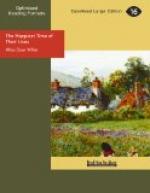“You fear them.”
“Yes,” she went on, now interested only in expressing her belief, “I fear their ignorance and idleness and irresponsibility and self-indulgence, and, all the more because it is so delicate and attractive and unconscious; and their belief that the world owes them luxury and happiness without their lifting a finger. I fear their cowardice and lack of character—”
“Cowardice!” he cried, catching at the first word he could. “My dear Mrs. Wayne, the aristocrats in the French Revolution, the British officer—”
“Oh, yes, they know how to die,” she answered; “but do they know how to live when the horrible, sordid little strain of every-day life begins to make demands upon them, their futile education, the moral feebleness that comes with perfect safety! I know something can be made of such girls, but I don’t want my son sacrificed in the process.”
There was a long, dark silence; then Mr. Lanley said with a particularly careful and exact enunciation:
“I think, my dear madam, that you cannot have known very many of the young women you are describing. It may be that there are some like that—daughters of our mushroom finance; but I can assure you that the children of ladies and gentlemen are not at all as you seem to imagine.”
It was characteristic of Mrs. Wayne that, still absorbed by her own convictions, she did not notice the insult of hearing ladies and gentlemen described to her as if they were beings wholly alien to her experience; but the tone of his speech startled her, and she woke, like a person coming out of a trance, to all the harm she had done.
“I may be old-fashioned—” he began and then threw the phrase from him; it was thus that Alberta, his sister, began her most offensive pronouncements. “It has always appeared to me that we shelter our more favored women as we shelter our planted trees, so that they may attain a stronger maturity.”
“But do they, are they—are sheltered women the strongest in a crisis?”
Fiend in human shape, he thought, she was making him question his bringing up of Adelaide. He would not bear that. His foot stole out to the self-starter.
For the few minutes that remained of the interview she tried to undo her work, but the injury was too deep. His life was too near its end for criticism to be anything but destructive; having no time to collect new treasure, he simply could not listen to her suggestion that those he most valued were imitation. He hated her for holding such opinion. Her soft tones, her eager concessions, her flattering sentences, could now make no impression upon a man whom half an hour before they would have completely won.
He bade her a cold good night, hardly more than bent his head, the chauffeur took the heavy coat from her, and the car had wheeled away before she was well inside her own doorway.
Pete’s brown head was visible over the banisters.




